
Peasmarsh Festival 2022
2022 Guest Artists
Sally Beamish, composer
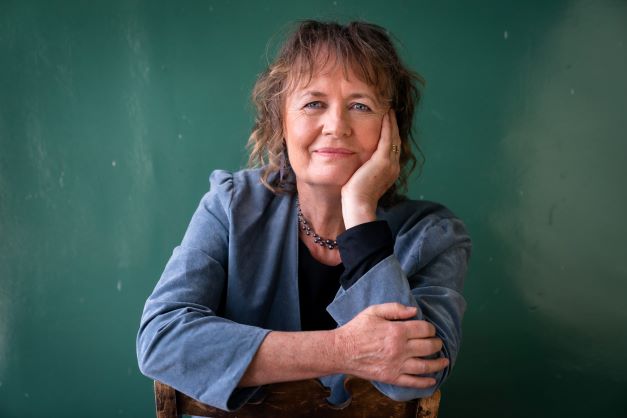 Sally Beamish was born in London. She studied viola at the RNCM with Patrick Ireland, and in Detmold with Bruno Giuranna, and was a founder member of the Raphael Ensemble. She also performed regularly with the Academy of St Martin-in-the-Fields and the London Sinfonietta, and was principal viola in the London Mozart Players and Scottish Chamber Orchestra.
Sally Beamish was born in London. She studied viola at the RNCM with Patrick Ireland, and in Detmold with Bruno Giuranna, and was a founder member of the Raphael Ensemble. She also performed regularly with the Academy of St Martin-in-the-Fields and the London Sinfonietta, and was principal viola in the London Mozart Players and Scottish Chamber Orchestra.
She moved from London to Scotland in 1990 to develop her career as a composer. Her music embraces many influences: particularly jazz and Scottish traditional music.
She has recently moved to Brighton, and is married to writer Peter Thomson. She still performs regularly as violist, pianist and narrator.
Since 1999 her music has been championed by the BIS label, who have recorded much of her work.
In February 2012 Beamish was BBC Radio 3 Composer of the Week; and this was repeated in 2015.
Her ballet The Tempest for Birmingham Royal Ballet and Houston Ballet, with choreographer David Bintley, was premiered in October 2016 at Birmingham Hippodrome and Sadler’s Wells, London, with the US premiere by Houston Ballet in May 2017.
Her second ballet, The Little Mermaid, (choreographer David Nixon) was premiered in September ’17 by Northern Ballet, and toured the UK with 75 performances.
In 2018 she was featured composer at the Ryedale and Trondheim festivals, performing with the Orchestra of the Age of Enlightenment as narrator, and with the Elias and Chilingirian Quartets on viola, as well as several appearances as pianist.
She is now composer-in-residence with the Academy of St Martin-in-the-Fields, for which she has written a string octet, Partita, and an orchestral piece, Hover, which was featured at their 60th anniversary gala concert at London’s Queen Elizabeth Hall in November 2019.
The Judas Passion, with libretto by David Harsent, was jointly commissioned by the Orchestra of the Age of Enlightenment and Philarmonia Baroque, and was performed in London and San Francisco in 2018, conducted by Nicholas McGegan, with soloists Mary Bevan, Brenden Gunnell and Roderick Williams.
Sally Beamish is the recipient of an honorary doctorate from the University of Glasgow, a Creative Scotland Award, and a Paul Hamlyn Award, and is a fellow of the Royal Society of Edinburgh. In 2018 she was awarded the Inspiration Award at the British Composer Awards, in recognition of lifetime achievement. She was awarded an OBE in the 2020 Queen’s Birthday Honours.
Current projects include a concerto for violinist Janine Jansen and clarinettist Martin Fröst, commissioned by the Concertgebouw and Swedish Radio Orchestra, Oslo Philharmonic, and London Symphony Orchestra. The premiere is scheduled for April 2021 in Amsterdam, conducted by Thomas Hengelbrock.
She is writing a choral piece commissioned by Quakers Concern for the Abolition of Torture, with libretto by Peter Thomson.
As a performer, she is a member of the string quintet Ensemble V, and also the York Road Band, with Peter Thomson on vocals and guitarist Arthur Dick. In January, with pianist Nancy Cooley, she will premiere a new work for viola and piano commissioned by her long-term patron, Dr Gerry Mattock, at Brighton Friends Meeting House. She plays on a viola made by her daughter, Stephanie Irvine.
Her music is published by Edition Peters and by Norsk Musikforlag.
James Crabb, classical accordion
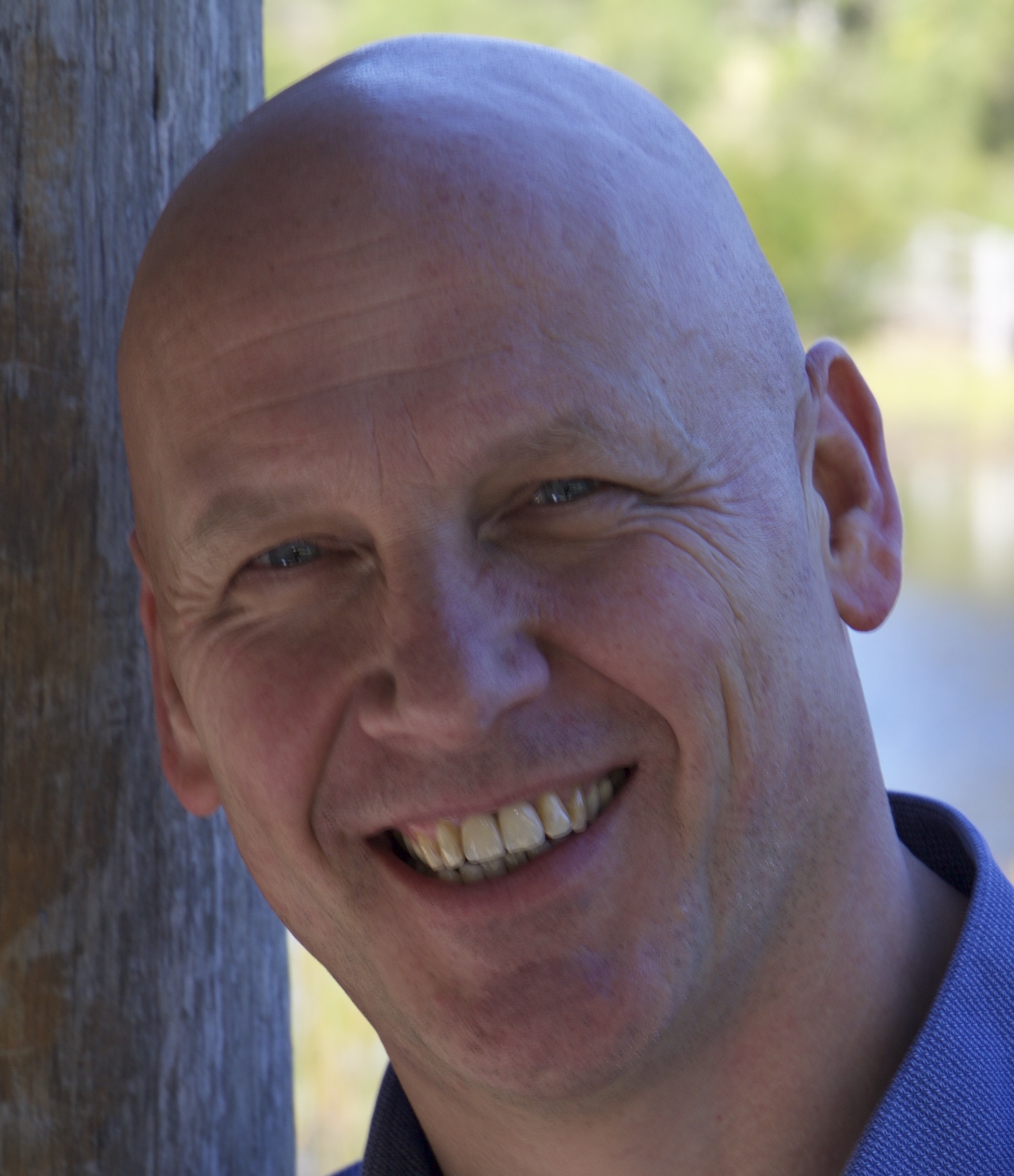 Internationally praised for his breathtaking virtuosity and versatile musicianship, Scottish born James Crabb is widely regarded as one of the world’s leading classical accordionists. He studied at the Royal Danish Academy of Music, Copenhagen with accordion pioneer Mogens Ellegaard and became professor there from 1995 until 2010. He also held a long-standing guest professorship at the University in Graz, Austria. James was awarded the prestigious Carl Nielsen Music Prize, Denmark in 1991.
Internationally praised for his breathtaking virtuosity and versatile musicianship, Scottish born James Crabb is widely regarded as one of the world’s leading classical accordionists. He studied at the Royal Danish Academy of Music, Copenhagen with accordion pioneer Mogens Ellegaard and became professor there from 1995 until 2010. He also held a long-standing guest professorship at the University in Graz, Austria. James was awarded the prestigious Carl Nielsen Music Prize, Denmark in 1991.
In 2019 James gave the world premiere of Brett Dean’s accordion concerto The Players in Sweden, (recorded on the BIS label); featured in Co.3 Dance company’s In Line production in Perth; play-directed Sinfonia Cymru, Wales; and performed the on-stage role in Dean’s Hamlet with Cologne Opera.
Recent and upcoming return engagements include performances at the Australian and Tasmanian chamber music festivals, Canberra International Music Festival, a residency at Australian National Academy of Music, ACO, Melbourne and West Australian Symphony Orchestras, and UKARIA. James continues to inspire composers to write for him and maintains a busy schedule as a curator, soloist and chamber musician.
A passionate and sought-after music educator and mentor, James collaborates regularly with ANAM, Freedman Fellowship Trust AYO, Music Viva as well as music conservatories and universities both in Australia and abroad. He was Artistic Director of the Four Winds Festival in Bermagui, NSW, from 2016 – 2020 during which time he curated both the annual Easter and Youth Festivals and developed the music education programs in local schools. Since 2010 James has resided in Sydney with his wife and 2 sons.
Magnus Johnston, violin
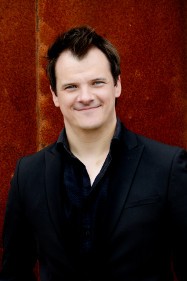 Magnus Johnston is recognised as one of the most distinguished chamber musicians of his generation. A past member of both the Navarra String Quartet and the Aronowitz Ensemble, Magnus has been a recipient of two Borletti-Buitoni Trust Awards and a place on BBC Radio 3ʼs New Generation Artists Scheme. Aside from his dedication to chamber music, Magnus has been in demand as Guest Leader and Principal of orchestras such as the Royal Opera House, Covent Garden, English National Opera, Philharmonia, Britten Sinfonia, Halle, Amsterdam Sinfonietta, Scottish and Australian Chamber Orchestras.
Magnus Johnston is recognised as one of the most distinguished chamber musicians of his generation. A past member of both the Navarra String Quartet and the Aronowitz Ensemble, Magnus has been a recipient of two Borletti-Buitoni Trust Awards and a place on BBC Radio 3ʼs New Generation Artists Scheme. Aside from his dedication to chamber music, Magnus has been in demand as Guest Leader and Principal of orchestras such as the Royal Opera House, Covent Garden, English National Opera, Philharmonia, Britten Sinfonia, Halle, Amsterdam Sinfonietta, Scottish and Australian Chamber Orchestras.
As a chorister of the choir of Kingʼs College Cambridge, Magnus toured extensively at a young age, going on to study at Chethamʼs School of Music in Manchester and later the Royal Northern College of Music.
Magnusʼ passion for chamber music led to the birth of the Aronowitz Ensemble, a unique chamber group of string sextet & piano. The ensemble made their debut performance to a sold out St Johnʼs Smith Square, and enjoyed a busy touring schedule along with frequent live broadcasts & studio recordings for BBC Radio 3.
As a member of the Navarra Quartet, Magnus made appearances at major venues and festivals throughout Europe and the World including the Wigmore Hall, Amsterdam Concertgebouw, Lincoln Center New York, Aix en Provence, Berlin Konzerthaus, Sydney Opera House and the BBC Proms.
Ori Kam, viola
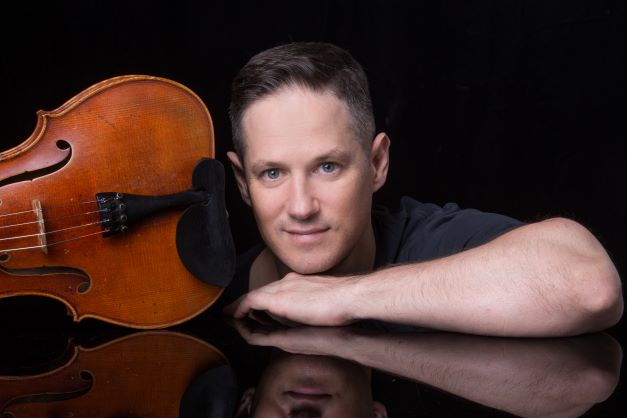 Hailed by the New York Times as “an attractive, engaging presence on stage,” violist Ori Kam has performed as soloist on some of the world’s premier stages.
Hailed by the New York Times as “an attractive, engaging presence on stage,” violist Ori Kam has performed as soloist on some of the world’s premier stages.
After his debut at the age of 16 with the Israel Philharmonic Orchestra under the baton of Zubin Mehta, he was immediately re-engaged. Since then, he has performed with virtually every orchestra in Israel, the National Symphony at the Kennedy Center in Washington DC, the New Jersey Symphony, the Bronxville Symphony, the Manhattan Philharmonia, and Sinfonia Varsovia.
Mr. Kam is a frequent recitalist and has performed extensively throughout the US, Europe, and Israel. His recital appearance at Carnegie Hall’s Weill Recital hall received reviews such as “(Kam is) a rare viola soloist,” and “Mr. Kam’s playing (was) at once mature and youthfully exuberant.”
As an avid performer of chamber music, Mr. Kam is the violist of the Jerusalem String Quartet. He founded the Israel Chamber Music Society and was the violist of the Naumburg award winning Whitman String Quartet. Independently, he has appeared alongside artists such as Isaac Stern, Daniel Barenboim, Andras Schiff, Itzhak Perlman and Pinchas Zukerman. He has performed with the Chamber Music Society of Lincoln Center and was guest artist in numerous festivals including Salzburg, Verbier, Tangelwood, Aspen, Santa-Fe, Schleswig-Holstein, La Jolla, the Schubertiade, and the Jerusalem Chamber Music Festival to name a few.
Mr. Kam was born to Israeli Parents in La Jolla, CA in 1975, and grew up in Israel. He started his musical Education at the age of 6, and began playing the viola at 15. In Israel, he studied with renowned teacher Chaim Taub, and between 1994 and 1997, studied with Pinchas Zukerman and Patinka Kopec at the Manhattan School of Music in New York. Later, he concluded his studies with Wilfried Strehle at the University for the arts in Berlin. Between 2004 and 2006 he was a member of the Berliner Philharmoniker.
Mr. Kam has been the winner of several awards and prizes including The Swiss Prize at the Geneva Int’l Music Competition, The “Pagannini” Prize in the Int’l Lionel Tertis Competition, and in ’95 was the winner of the concerto competition at the Manhattan School of Music. Last season he was awarded the S&R Washington Award grand prize. From 1990 to 2000, he has been a recipient of scholarships from the America-Israel Culture Foundation. Since 2009 he has held a professor of viola position at the University of Geneva.
In 2007, He released his first commercial recording under the “Berlin Classics” label of the Bruch Double concerto for viola and clarinet, which he recorded with his sister Sharon. A CD of the 12 Telemann Fantasies for solo viola followed in 2010 on the same label. He can also be heard on the Decca and Naxos Labels. He has also recorded Pierre Boulez’s “Le Marteau Sans Maitre”, conducted by Boulez himself, for Deutsche Gramophone. The Jerusalem Quartet records regularly for Harmonia Mundi.
Hannes Minnaar, piano
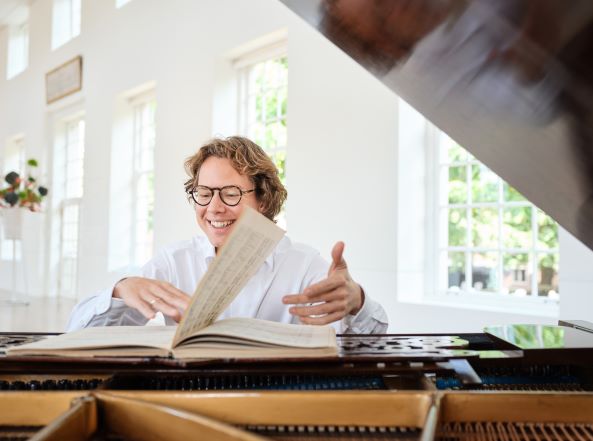 An artist who performs to serve the music, the musical language of Hannes Minnaar is that of a deeply conscientious musician, fully respectful of the score, and yet marking every performance with his own language at the keyboard. Taking a prize in the 2010 Queen Elizabeth Competition set him on this course where he is now recognised throughout his native Holland, Minnaar performs in all the great concert halls both in recital and with the major orchestras.
An artist who performs to serve the music, the musical language of Hannes Minnaar is that of a deeply conscientious musician, fully respectful of the score, and yet marking every performance with his own language at the keyboard. Taking a prize in the 2010 Queen Elizabeth Competition set him on this course where he is now recognised throughout his native Holland, Minnaar performs in all the great concert halls both in recital and with the major orchestras.
Of his impressive discography the complete Beethoven Piano Concertos (Netherlands Symphony Orchestra under the baton of Jan Willem de Vriend), the Emperor Concerto was a recommended recording on BBC Radio 3’s Building a Library. It was said to have ‘passion, drama, vital rhythms, transparency, and, more important: a celebration of unity, with pianist and orchestra continually sparking off each other.’ His many recital discs have also consistently gained attention. Het Parool claimed of Nox (solo works of Schumann, Ravel and Robert Zuidam), released during the pandemic that, “he joins the ranks of the greatest pianists of our time”. His disc of Bach’s Goldberg Variations released in September 2021 is receiving equal high praise.
Highlights of the 2022/23 season include performances of Shostakovich’s Preludes and Fugues, Op. 87 alongside the release of the disc of this repertoire. Concerto performances include the Dutch premiere of Jörg Widmann’s Trauermarsch with the Netherlands Radio Philharmonic and James Gaffigan at a Zaterdag Matinee performance in the Concertgebouw and he brings a recital programme to the UK.
Heath Quartet
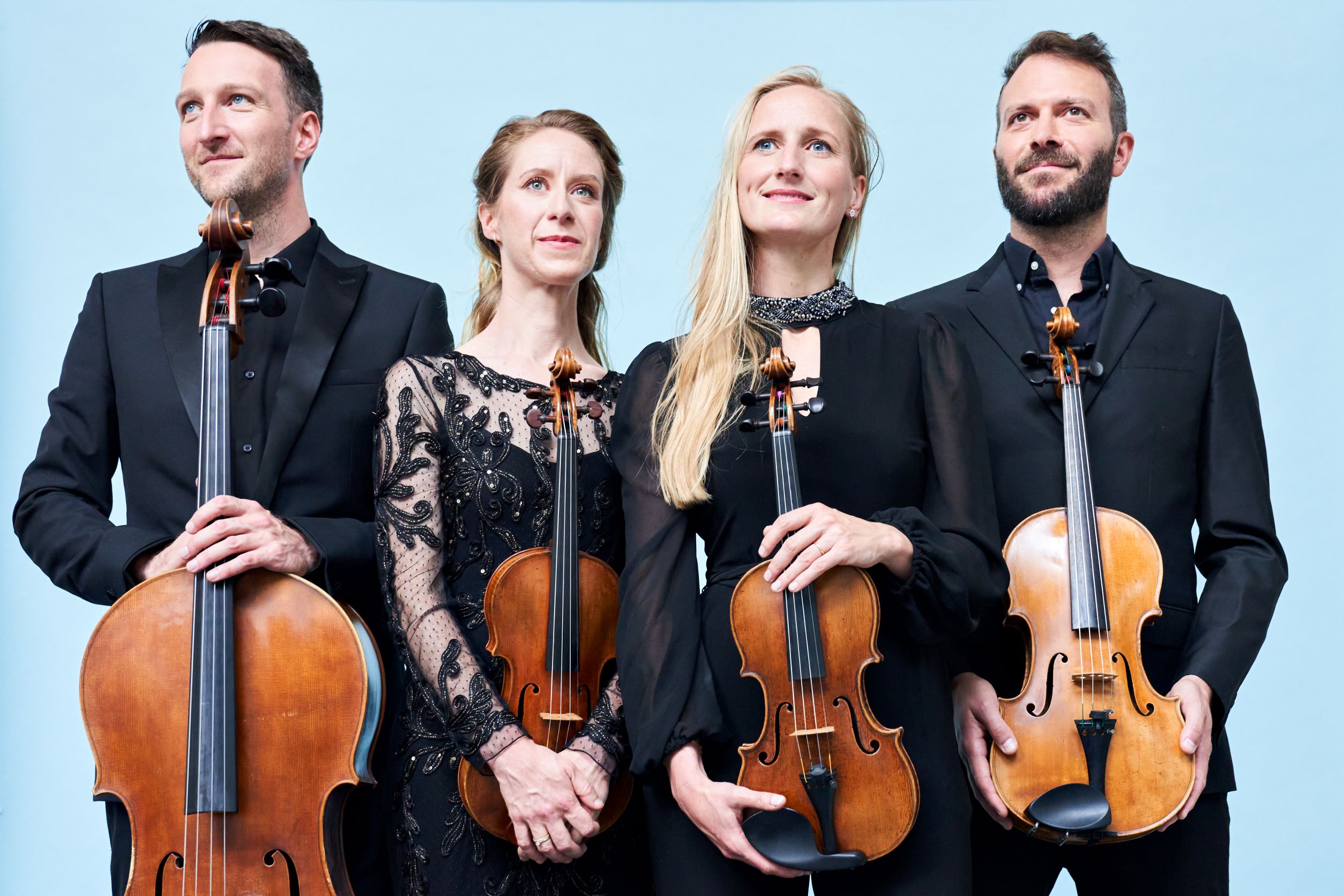 Sara Wolstenholme, violin
Sara Wolstenholme, violin
Marije Johnston, violin
Gary Pomeroy, viola
Christopher Murray, cello
The charismatic and sought-after Heath Quartet won the 2016 Gramophone Chamber Award for their recording of the complete string quartets of Sir Michael Tippett, and in May 2013 became the first ensemble in fifteen years to win the prestigious Royal Philharmonic Society’s Young Artists Award.
Formed in 2002 at the Royal Northern College of Music they were selected for representation by YCAT, awarded a Borletti-Buitoni Special Ensemble Scholarship and in 2012 won the Ensemble Prize at the Festspiele Mecklenburg Vorpommern where they are now regular visitors. Following their award-winning debut recording of Tippett on the Wigmore LIVE label, the quartet recorded two discs for the Harmonia Mundi/PIAS label featuring Tchaikovsky’s first and third quartets (November 2016) and the complete Bartók quartets (June 2017), the latter being shortlisted for the 2018 Gramophone Chamber Award and the winner of the 2017 Limelight Chamber Recording of the Year award.
The 2021/22 season sees the quartet perform around the UK while continuing their longstanding relationship with the Wigmore Hall, to include the European Premiere of Helen Grime’s String Quartet No. 2. This piece will also feature in their Boulez Saal Berlin residency, where the quartet will also reunite with Jörg Widmann for a performance of his Clarinet Quintet. Other highlights include their Barcelona debut in Palau de la Musica Catalana with soprano Carolyn Sampson and performances at both the Mecklenberg Vorpommern spring and summer festivals. The quartet also look forward to their forthcoming release on Signum Records with Carolyn Sampson featuring works by Berg, Webern and Schoenberg.
Recent highlights include a Beethoven series at Bath Festival, debuts at Elbphilharmonie Hamburg, Saffron Hall and Cheltenham Festival, as well as returns to Handelsbeurs Ghent and the Aldeburgh, Brighton and Norfolk & Norwich festivals. Further afield the quartet took part in the Adelaide Festival of the Arts and had two return visits to Middlebury College in Vermont for a Beethoven Cycle, with a planned third recital lost to the pandemic.
Notable performances of previous seasons have included the world premiere of John Tavener’s Requiem Fragments at the BBC Proms, concerts at the Beethovenfest Bonn, their debuts at the Musée d’Orsay and Louvre Auditorium in Paris and the world premiere of Dobrinka Tabakova’s Highland Pastorale performed at their Cheltenham Festival debut. In 2018 they made their debut tour of New Zealand. In the UK, they have also performed at the Barbican, Bridgewater Hall, Sage Gateshead, Perth Concert Hall and Queen’s Hall Edinburgh. In Europe they have appeared at the Kissingen Winterzauber and Schwetzinger Festivals as well as Concertgebouw Amsterdam, deSingel Arts Centre in Antwerp, Vara Konserthus in Sweden, Esterházy Palace, and the Musikverein and the Konzerthaus in Berlin and Vienna.
Strong exponents of contemporary music, the quartet have also worked with several leading composers including Hans Abrahamsen, Helen Grime, Louis Andriessen, Brett Dean, Anthony Gilbert, and Sofia Gubaidulina. They took part in the European première of Steve Mackey’s Gaggle and Flock for string octet, the world première of John Musto’s Another Place with Carolyn Sampson at the Wigmore Hall as well as receiving unanimous critical acclaim for their performance of Ligeti’s Quartet No.2 and Thomas Ades’ Arcadiana for The Park Lane Group at the Purcell Room. In 2018 they embarked on a special project with Spanish director Calixto Bieto, in a co-production between the Birmingham Repertory Theatre and Holland Festival with performances throughout Europe, which was revived the following year for performances at Festival L’autonne Paris.
The Heath Quartet regularly enjoy working with a host of talented collaborators who also include Anna Caterina Antonacci, James Baillieu, Ian Bostridge, Adrian Brendel, Michael Collins, Colin Currie, Stephen Hough, Sunwook Kim, Richard Lester, Joanna MacGregor, Aleksandar Madzar, Anthony Marwood, Mark Padmore, Lawrence Power, Jamie Walton and the Tokyo Quartet, and have even ventured into the world of jazz in a ‘Wigmore Late’ concert together with saxophonist Trish Clowes and pianist Gwilym Simcock.
12 Ensemble
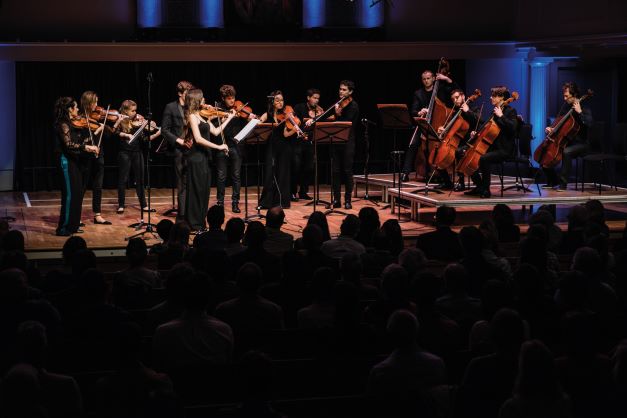 The 12 Ensemble is a pioneering un-conducted string ensemble. Modern, dynamic and virtuosic, the group has rapidly developed a reputation as one of Europe’s most exhilarating collectives, moving audiences worldwide with powerful musical experiences.
The 12 Ensemble is a pioneering un-conducted string ensemble. Modern, dynamic and virtuosic, the group has rapidly developed a reputation as one of Europe’s most exhilarating collectives, moving audiences worldwide with powerful musical experiences.
Formed in 2012 by Artistic Directors Eloisa-Fleur Thom & Max Ruisi, the 12 Ensemble’s unique approach to rehearsing, performing & programming sets them apart as a revolutionary ensemble relevant in the 21st century. Exploring great music of the past alongside ground-breaking new commissions and collaborations with outstanding contemporary artists, the ensemble sets itself no boundaries and reaches diverse audiences with exceptional musical experiences.
Always playing without conductor, the core formation brings together twelve of London’s leading chamber musicians. Without a conductor, every member of the group develops an intense engagement with the music they play, combining the thrilling energy, commitment and spontaneous creativity of a small ensemble with the breathtaking sound and power afforded by a larger string orchestra.
The 12 Ensemble are in demand internationally, recently performing at leading venues including the Barbican, Royal Albert Hall, Wigmore Hall, Berlin Philharmonie and Elbphilharmonie, Hamburg. The group have also made appearances at leading festivals worldwide, including the BBC Proms in 2019 + 2020, plus performances in the U.S, South Korea and Iceland, as well as multiple broadcasts on BBC TV, Radio 3 + Radio 6 Music. The ensemble have collaborated with contemporary artists such as Max Richter, Jonny Greenwood, Nick Cave, Laura Marling, The National, Elena Tonra and choreographer Alexander Whitley. The group recorded on Jonny Greenwood’s soundtrack to the films ‘Spencer’ and ‘The Power of the Dog’, and also feature onscreen in Andrew Dominik’s new film ‘This Much I know To Be True’, exploring the collaborations of Nick Cave and Warren Ellis.
The 12 ensemble have released two highly critically-acclaimed albums, Resurrection (2018) and Death and the Maiden (2020). With their own arrangement of Schubert’s iconic string quartet at its heart, Death and the Maiden is a highly-charged personal journey through an evolving musical landscape, featuring accompanying works by Tavener and Icelandic band Sigur Rós plus a new commission from the ROH Composer-in-Residence Oliver Leith.
Sam Glazer, animateur
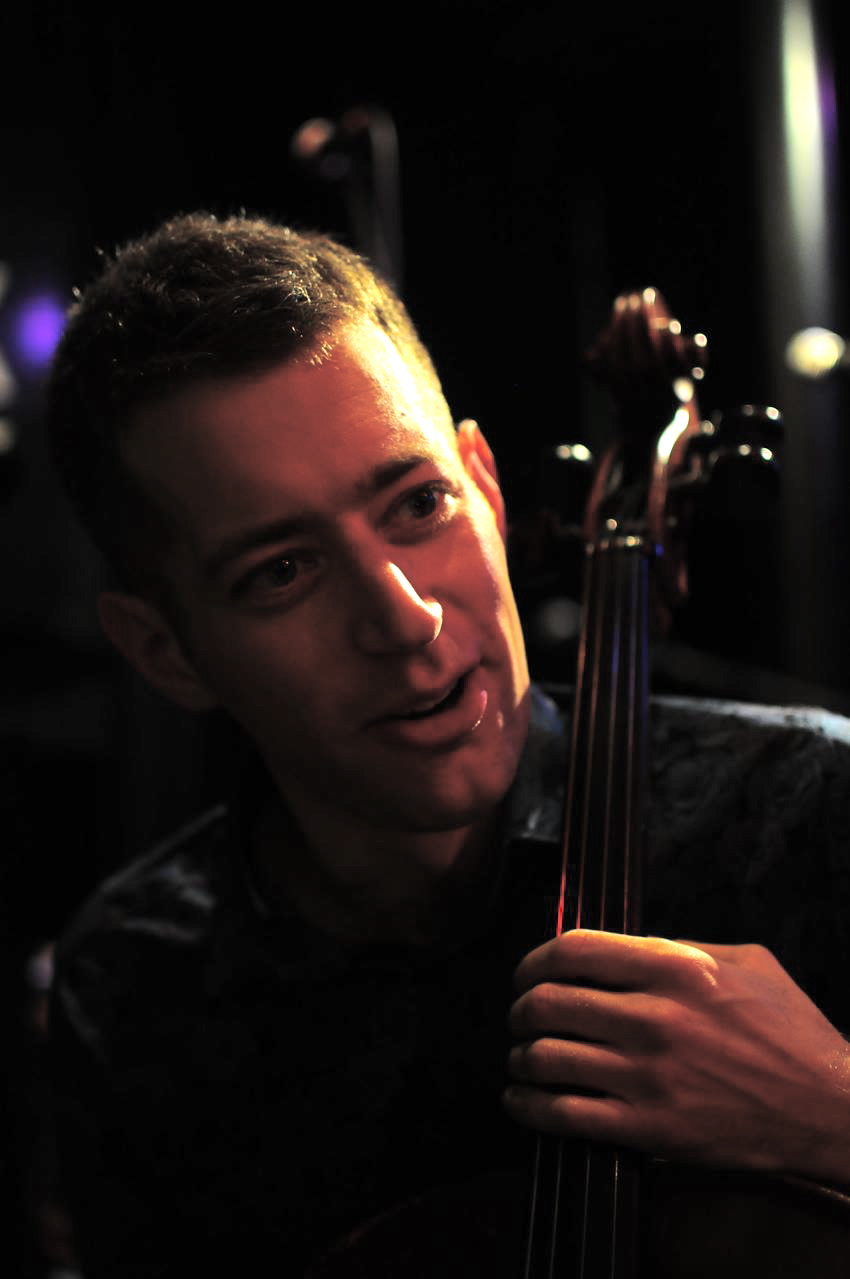 Sam Glazer is a composer, cellist and creative leader. He is co-creator of Spitalfields Music’s RPS-shortlisted Musical Rumpus, making operas for babies and toddlers, touring London, nationally and internationally (2012-2017). His choral score for circa’s Depart (LIFT/ Spitalfields Music/ Hull UK City of Culture 2017/ LeftCoast/ Brighton Festival) premiered in an East London Victorian woodland cemetery, and toured the UK in 2017. In 2018 he was commissioned by the Peasmarsh Chamber Music Festival to compose a new song cycle for children’s voices and string quartet, inspired by the commedia dell’arte. His latest commission, for Den Jyske Oper, was Hjerte Lyd, a new opera for babies and toddlers, which toured Denmark in 2019.
Sam Glazer is a composer, cellist and creative leader. He is co-creator of Spitalfields Music’s RPS-shortlisted Musical Rumpus, making operas for babies and toddlers, touring London, nationally and internationally (2012-2017). His choral score for circa’s Depart (LIFT/ Spitalfields Music/ Hull UK City of Culture 2017/ LeftCoast/ Brighton Festival) premiered in an East London Victorian woodland cemetery, and toured the UK in 2017. In 2018 he was commissioned by the Peasmarsh Chamber Music Festival to compose a new song cycle for children’s voices and string quartet, inspired by the commedia dell’arte. His latest commission, for Den Jyske Oper, was Hjerte Lyd, a new opera for babies and toddlers, which toured Denmark in 2019.
Sam has led projects for The Sixteen, the Royal Philharmonic Orchestra and Sinfonia Viva and developed creative learning programmes for the Peasmarsh Chamber Music Festival, the Winchester Chamber Music Festival and the Mid-Wales Music Trust. He has devised and presented schools concerts for the Britten Sinfonia, Sinfonia Cymru and the Royal Welsh College of Music and Drama. Sam has been involved for over ten years with Wigmore Hall’s pioneering Music for Life project, working in care homes with people with dementia, and subsequently went on to co-found Raise Your Voice Opera, Glyndebourne’s group for people with dementia and their carers living in the community. Since 2005 he has been teaching at the Royal Academy of Music, mentoring young musicians who are studying Music in the Community, and he is currently lead mentor for Spitalfields Music’s Trainee Music Leader programme. Sam plays and sings with the groundbreaking band Firefly Burning, who released their latest album Breathe Shallow in May 2019 with support from the PRSF and Snape Maltings.
 2022 Programme
2022 Programme
1) FESTIVAL OPENING
Thursday 23 June, 8pm
Anthony Marwood, Richard Lester, Magnus Johnston, Ori Kam, Hannes Minnaar, Christopher Murray, Gary Pomeroy, Heath Quartet
- Beamish Carnival Samba – Floreant!
- Haydn String Quartet in F minor, Op.20 No.5
- Schumann 6 Etudes in Canonic Form, Op.56 (arr Kirchner) for violin, cello and piano
- Beethoven String Quintet in C major, Op.29
Composed midway through his exploration of the string quartet (he composed 18 in three years between 1769-1772), Haydn’s Op.20, one of the Sun Quartets, is followed by Robert Schumann’s rarely performed Canonic Studies. Baroque in flavour, these studies – originally written for the pedal piano (a piano with additional pedal keyboard, which the Schumanns purchased to facilitate organ practice at home) – are performed here in Kirchner’s arrangement for piano trio. Beethoven’s only full length string quintet, a transitional work from his early style to second period, was composed in 1801, as he confronted the reality of his hearing loss. We open with Sally Beamish’s festive Carnival Samba, composed in 2003 for the Florestan Trio.
Venue: Church of St Peter & St Paul, Peasmarsh
2A+B) HEATH QUARTET / YOUNG COMPOSERS
Expertly led by Sam Glazer, with performances by members of the world renowned Heath Quartet, we are delighted to present some of the new works composed by children from our partner primary schools in their workshops during the summer term in two interactive public concerts for all ages. Please note there are limited spaces for audience members to attend. Please indicate on the booking form if you would like to attend one of these concerts.
2A) YOUNG COMPOSERS IN PEASMARSH
Friday 24 June 10.30am
Members of the Heath Quartet, Sam Glazer, children from local primary schools
Venue: Church of St Peter & St Paul, Peasmarsh
2B) YOUNG COMPOSERS IN WINCHELSEA
Friday 24 June, 1pm
Members of the Heath Quartet, Sam Glazer, children from local primary schools
Venue: St Thomas’ Church, Winchelsea
Education work at the Peasmarsh Chamber Music Festival is generously funded by Rother District Council, High Weald Arts Society, Sussex Community Foundation, the Rudi Martinus van Dijk Foundation and The Kowitz Family Foundation.
3) ORCHESTRAL CONCERT – VOYAGE OF DISCOVERY
Friday 24 June, 8pm
Anthony Marwood, Richard Lester, James Crabb (soloists)
Eloisa-Fleur Thom (director)
12 Ensemble
- Haydn Cello Concert No.1 in C major, Hob. VIIb/1
- Britten Variations on a Theme of Frank Bridge, Op.10
- JS Bach Brandenburg Concerto No.3 in G major, BWV1048 (including a Slow Movement by Sally Beamish)
- Beamish Seavaigers for violin, classical accordion and strings
Presumed lost until 1961, when the manuscript turned up amongst other papers in the Prague National Museum, Haydn’s early cello concerto is now considered fully authenticated and has claimed its place as an important work in the cello repertoire. Britten’s Frank Bridge Variations, a pillar of 20th Century string writing that launched Benjamin Britten’s career internationally, precedes Bach’s Brandenburg Concerto No. 3, a work at the centre of the Baroque canon. Composed, unusually, with a brief Adagio (or violin cadenza) where a slow movement might have been, it is heard here with Sally Beamish’s improvisatory slow movement. The concert concludes with Sally Beamish’s evocation of the beauty and drama of the North Sea. Written in collaboration with soloists in the Celtic tradition (specifically Scottish fiddle and Celtic harp), the score of Seavaigers leaves space for soloists James Crabb and Anthony Marwood to depict their own perilous sea voyage.
Venue: St Mary’s Church, Rye
4) SATURDAY MORNING CONCERT
Saturday 25 June, 11.30am
Anthony Marwood, Richard Lester, Magnus Johnston, Ori Kam, Hannes Minnaar, Heath Quartet
- R Schumann Märchenbilder, Op.113 for viola and piano
- JS Bach 2-part canons from Art of Fugue, BWV1080
- Kurtág Signs, Games and Messages (excerpts for string trio)
- JS Bach Ricercar a 6 from ‘a Musical Offering’, BWV1079
- Brahms String Quartet in C minor, Op.51 No.1
Despite the first signs of mental turmoil on the horizon, Schumann’s gorgeous miniatures are full of beauty as he revisits the fantasy world of his earlier piano music. A selection of Kurtág’s exquisite Signs, Games and Messages, in which the composer looks for the purist musical expression through the most minimal means, follows Bach’s 2-part canons; published posthumously in 1751 for unspecified instrumentation, the Art of Fugue explores the contrapuntal possibilities contained in a single musical idea. Based on a single theme given to him by King Frederick the Great, Bach’s fugue in six voices is considered the high point of his remarkable collection of canons and fugues for solo keyboard, performed here by string sextet. Brahms’ first string quartet, preceded by 20 sketches of quartets that did not make it to publication, is the perfect example of the composer’s technique of developing variation, with an entire work developing from a single motif.
Venue: Church of St Peter & St Paul, Peasmarsh
5) EARLY EVENING CONCERT
Saturday 25 June, 6.30pm
Anthony Marwood, Richard Lester, Magnus Johnston, Ori Kam, Hannes Minnaar, Gary Pomeroy, Heath Quartet
- Mozart String Quintet No.1 in B flat major, K.174
- Britten String Quartet No.3 in G major, Op.94
- Korngold Suite for two violins, cello and piano left hand, Op.23
Mozart’s first viola quintet, in which the young Austrian explored the rich, dark tones of the instrument that so fascinated him, precedes Britten’s final major work. Completed in Venice during what he may have realised was to be his last visit, and premiered at The Maltings in Snape two weeks after his death, Britten’s third quartet references the composer’s opera Death in Venice, and is full of personal significance. Composed at the age of 32 (a late work in the scheme of things – the prodigious Korngold’s ballet, The Snowman, took Vienna by storm when he was just 11), his remarkable Op.23 was commissioned by pianist Paul Wittgenstein, determined to resume his career following the loss of his arm in WWI.
Venue: Church of St Peter & St Paul, Peasmarsh
6) LATE NIGHT CONCERT – JAMES CRABB: TANGO AND FRIENDS
Saturday 25 June, 9.45pm
- Piazzolla (arr.Crabb) 3 Tangos: SVP; Tzigane Tango; Preparense
- McPherson Stramash
- Scottish set Mary Scot; Cuckold out of the Amery
- Gardel (arr.J. Williams) Por una Cabeza
- Piazzolla (arr.Crabb) Chiquilin de Bachin (acc, vln)
- Piazzolla (arr.Crabb) Escualo
James Crabb, Richard Lester, Anthony Marwood, Gary Pomeroy
Join world famous classical accordionist, James Crabb, and festival directors Anthony Marwood and Richard Lester, for an atmospheric night to remember including a celebration of the fiery Argentinian tango.
Venue: Church of St Peter & St Paul, Peasmarsh
7) SUNDAY MORNING CONCERT – GOLDBERG VARIATIONS
Sunday 26 June, 11.30am
Hannes Minnaar
- JS Bach Goldberg Variations for keyboard, BWV988
‘The musical richness and internal logic of the variations had kept me refreshed and grounded….. The opportunity to share this music turned the series of concerts into an emotional reunion with my audiences.’ – Hannes Minnaar on performing the Goldberg Variations during 2020
Following his critically acclaimed tour of churches in the Netherlands, pianist Hannes Minnaar brings his performance of Bach’s divine Goldberg Variations to Peasmarsh.
Venue: Church of St Peter & St Paul, Peasmarsh
8) SUNDAY AFTERNOON – MUSICAL TALK: SALLY BEAMISH AND JAMES CRABB
Sunday 26 June, 4.30pm
Prolific composer and celebrated viola player, Sally Beamish, and world famous accordionist, James Crabb, discuss their lives in music. Illustrated with musical performances.
Venue: Church of St Peter & St Paul, Peasmarsh
9) FESTIVAL FINALE
Sunday 26 June, 7pm
Anthony Marwood, Richard Lester, James Crabb, Magnus Johnston, Ori Kam, Hannes Minnaar, Heath Quartet
- Haydn String Quartet in B flat, Op. 50 No. 1
- Korngold Much Ado About Nothing Suite, Op.11 for violin and classical accordion (transcribed by J Crabb)
- Brahms Piano Quintet in F minor, Op.34
Originally for small pit orchestra, and later expanded for the concert hall, Korngold arranged his lush and imaginative incidental music for violin and piano for a production of Much Ado which was so successful that the run was extended beyond the availability of the musicians. It is heard here performed by violin and classical accordion. Beginning life first as a string quintet, the young Brahms’s Op.34 was reimagined, following some constructive criticism from Joseph Joachim and Clara Schumann, as a sonata for two pianos, before finally emerging as the piano quintet that we know today.
Venue: Church of St Peter & St Paul, Peasmarsh
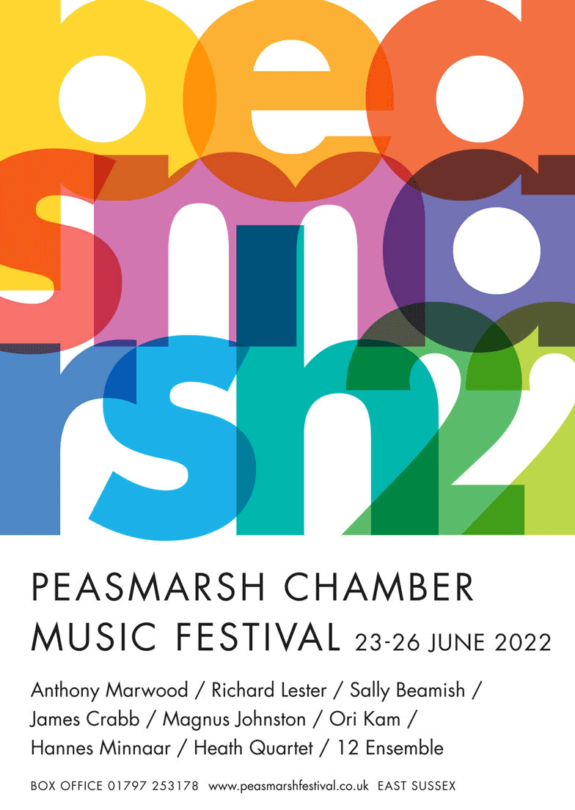 2022 Programme
2022 Programme